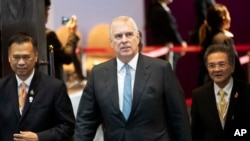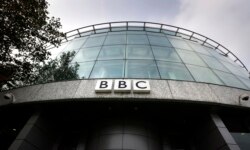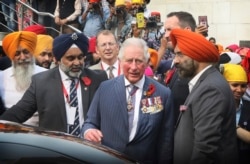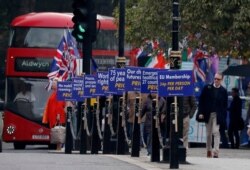Businesses and charities are starting to sever their ties with Britain's beleaguered Prince Andrew, also known as the Duke of York, and reputedly the favorite son of Queen Elizabeth, following what's been described as a "train wreck" of an interview in which he defended his friendship with the late American billionaire and convicted sex offender Jeffrey Epstein.
The abandonment by businesses of the prince deepens a crisis now engulfing Britain's royal family, weakening not only his standing but risking serious damage to the royal household and prompting questions about whether the 93-year-old queen has lost her grip and is no longer up to the task of managing the often fractious and scandal-prone family.
One of the world's leading accountancy films, KPMG, has pulled its sponsorship of the 59-year-old prince's flagship charity, Pitch@Palace. And others say they are set to follow, including the pharmaceutical giant AstraZeneca, in a growing backlash that shows no sign of abating and is isolating him.
Negative public reaction
Business executives are citing the negative public reaction to the prince's interview Saturday with the BBC, in which he failed to express sympathy for the teenagers trafficked and exploited by Epstein. Andrew said he didn't regret his friendship with the American financier. The 66-year-old Epstein killed himself in August in a New York jail after being arrested for sex trafficking minors, including girls as young as 14 years of age.
KPMG said its decision to withdraw sponsorship from the prince's charity, which focuses on young entrepreneurs, was due to "unsavory" issues stemming from the duke's friendship with Epstein. The firm's bosses made the decision last month but withheld the decision from the public.
In the 45-minute interview, which has been widely condemned in Britain and overseas, even in private by his normally loyal former wife, Sarah Ferguson, the Duke of York also repeated his denials that he had sex with an underage girl. Andrew said he couldn't recall ever having met Virginia Roberts Giuffre, an alleged Epstein victim, a formulation critics say is unconvincing. Giuffre alleges she was forced to sleep with the prince in London, New York and at Epstein's Caribbean retreat when she was a teenager.
‘Simply didn’t happen’
The prince said it "simply didn't happen," claiming that on the day of one of the alleged encounters, he was at a Pizza Express with one of his daughters outside London. He said he remembered going to the restaurant 18 years ago "weirdly distinctly" because "going to Pizza Express in [the town of] Woking is an unusual thing for me to do. A very unusual thing for me to do."
Prince Andrew also denied suggestions from Giuffre that he "sweated profusely" during intercourse by claiming he couldn't perspire for more than 20 years after an adrenaline rush while being shot at as a helicopter pilot in the Falklands War. Doctors have poured scorn on the diagnosis.
A post-interview opinion poll found just 6 percent of the British public believed the prince.
Legal jeopardy?
There's growing alarm in royal circles that the ill-advised interview — the prince's own PR adviser counseled against doing it and resigned when his boss disregarded him — may have placed him in greater legal jeopardy and will increase the pressure on him to agree to be interviewed by the FBI, which is probing the possible complicity of others in Epstein's crimes. The interview has only increased interest in the allegations against the prince, who told his mother after the filming that it had been a "success," according to local media reports.
Former members of the royal household say Buckingham Palace has been left reeling by the interview and subsequent backlash, and is at a loss about what to do now and is fearful about what may emerge in the future. There also are contradictory statements coming from palace insiders about whether the queen, as the BBC was led to believe, sanctioned the interview and approved the prince's decision to go ahead with it.
British lawyer Anna Rothwell told The Times that Andrew could be in legal trouble. "His friendship with the convicted sex offender Epstein is under investigation by the FBI, and he is vulnerable to extradition," Rothwell said. "It is therefore very unwise for the prince to give any account to the media, especially one which so starkly exposes the closeness of his relationship with Epstein."
Lisa Bloom, a U.S. attorney representing some of Epstein accusers, has said the prince needs to talk to the FBI. "I think he's made things worse for himself in this interview and I think it's more likely the authorities are going to want to speak to him now — and they should want to," she said. Spencer Kulvin, who represents one of Epstein's victims, said Prince Andrew's decision to go on camera "shocked" him because anything he said could be used in a cross-examination.
Extradition unlikely
Other lawyers, though, say extradition is unlikely as the prince currently appears to be only a witness and not a subject of investigation. Extradition doesn't cover witnesses.
Legal woes aside, further embarrassment is likely. A New York judge looks set to order by the end of the year the unsealing of 3,000 pages of legal testimony, which lawyers for Epstein's victims say will provide even more unsavory details of the billionaire's predatory behavior. The prince is named along with several other prominent figures in the documents, say the lawyers.
The growing debacle has commentators and former royal advisers reaching back for comparisons to the 1997 death of Princess Diana, the former wife of Andrew's older brother and heir to the throne Prince Charles, and to 1992, a year that saw the royal family rocked by divorces, separations and infidelities. The queen described 1992 as "annus horribilis," a Latin term meaning "horrible year."
Charles upset by interview
Royal insiders say Charles, who has started to take on more management of the family's affairs to help his aged mother, is said to be fuming about the interview, as well as his younger brother's friendship with Epstein. Charles is currently on a royal tour in New Zealand.
The two brothers have clashed in private in the past with Charles increasingly uneasy about some of the friendships his brother formed when serving as a roving trade envoy for Britain, including with Saif al-Islam Gadhafi, son of the late Libyan dictator Moammar Gadhafi, and Timur Kulibayev, the billionaire son-in-law of a former president of Kazakhstan. During his time as a trade envoy, which ended in 2011, "The line between his official schmoozing on the nation's behalf, and his networking among the rich on his own behalf, had become alarmingly blurred," according to Daily Mail commentator Richard Kay.
The two princes also have disagreed over Charles' plan to reduce the size of the monarchy when he eventually succeeds his mother, believing the institution would be more manageable, if there were fewer front-rank members. Prince Andrew has already complained about his two daughters being increasingly sidelined, according to palace insiders.
The queen, normally sure-footed, has faced a series of other challenges recently, including over the falling out of Charles' sons, William and Harry, a division said to stem from Harry's marriage to American actress Meghan Markle, and their decision to live a more independent life less constrained by protocol and palace guidance. Prince Harry and his wife recently announced they are suing British tabloids for defamation and breach of privacy — an action taken without prior palace approval and frowned on by royal insiders.
Troubled times
The signs of royal meltdown are adding to national unease about the state of health of Britain's institutions overall — Brexit divisions have fractured the country's storied political parties, the Conservatives and Labor, deadlocked the British Parliament and are fueling independence demands in Scotland.
On Monday, the country also was rocked by well-documented BBC allegations that successive British governments and the Army covered up war crimes committed by British troops in Afghanistan and Iraq with claims that soldiers from the SAS and Black Watch regiments executed children and tortured detainees.
Britain's Ministry of Defense said the allegations are unsubstantiated and all military operations are conducted in accordance with the law. In a statement, the ministry said, "After careful consideration of referred cases, the independent Service Prosecuting Authority decided not to prosecute. The BBC's claims have been passed to the Service Police and the Service Prosecuting Authority who remain open to considering allegations."



